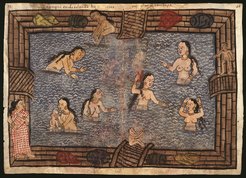Doing women’s legal history in the Iberian empires from a global perspective
Research Project

For centuries, history has had a gender, and it is male. The so-called ‘silence in the archives’ regarding women's experiences, viewpoints and presence continues to be perpetuated by the historiography, including in legal history and global history. This project seeks to challenge this silence by introducing a new field of study: women’s global legal history. Through case studies spanning different locations within the Iberian empires from the 16th to 19th centuries and utilising a variety of methodological approaches, it aims to make women visible and give them voice, rectifying their absence in legal history.
Members of this research group rely on various types of sources from local archives across different parts of the Empires, spanning different jurisdictions and periods. While most of the documents were not authored by women, their collective compilation allows for a broader understanding of women's actions. This includes how they organised themselves by forming groups and associations, how they influenced and were influenced by others, how they migrated, negotiated, worked, established networks, travelled, shared knowledge, wrote, expressed themselves in petitions and witness hearings, preserved their cultures in festivities, rituals and ceremonies, engaged in political movements and rebellions, assumed social and labour roles within society, and devised survival strategies. Such an approach not only enables the discovery of women in historical documents but also offers an opportunity to rewrite history by reading the archives through a critical lens, allowing for the identification of political and purposeful silences within the archives. This grants agency to various actors in history, and challenges conventional historical periodisations. Additionally, these sources can provide insights into locally constructed gender categories based on people's local knowledge. This highlights the flexibility of definitions surrounding gender identities, challenges presumptions surrounding normative impositions of heterosexuality and the immutability of sex notions, and brings fresh perspectives to ongoing debates about gender identity today. Recognising gender as a culturally contextualised category, we strive to explore its diverse meanings in legal history by focusing on the realm of social relations and human experiences.
To achieve this goal, the Women's Global Legal History project aims to bring women to the forefront by redefining the historical understanding of law as a product of their practices and knowledge. The project goes beyond merely exploring legal sources; it also creates an opportunity for the critical analysis of women's roles in shaping norms, law, law-making processes, the institutions of justice administration, and daily normative practices. Central to our research is the examination of how women's issues were perceived within the normative sphere of the colonial universe, placing their worldviews at the core of our analysis.
Cooperations
- DAAD – Project with Jessica O’Leary
